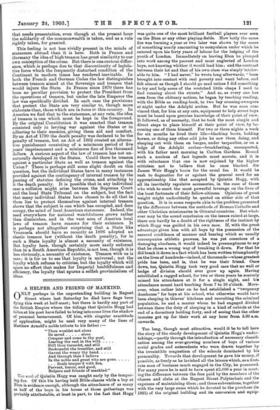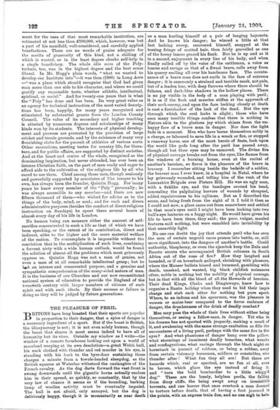A HELPER AND FRIEND OF MANKIND.
ONLY perhaps in the unpretending building in Regent Street where last Saturday he died have flags been flying this week at half-mast ; but there is hardly any part of the British Empire where the tidings that Quintin Hogg had fallen at his post have failed to bring into some lives the shadow of personal bereavement. Of him, with singular exactitude of application, might be used very many of the lines of Matthew Arnold's noble tribute to his father :— "Thou wouldst not alone Be saved alone
Conquer and come to thy goal,
Leaving the rest in the wild
Still thou turnedst, and still Beckonedst the trembler, and still Gayest the weary thy hand And through thee I believe In the noble and great who are gone . . . Souls temper'd with fire, Fervent, heroic, and good, Helpers and friends of mankind."
The soul of Quintin Hogg was caught early by the temper- ing fire. Of this bis having held Bible-classes while a boy at Eton is evidence enough, although the attendance of as many as half of the boys in his house at those gatherings was probably attributable, at least in part, to the fast that Hogg was quite one of the most brilliant football players ever seen on the Eton or any other playing-fields. How hotly the same fire was burning a year or two later was shown by the sense of something nearly amounting to compulsion under which he entered upon his forty years of labour for the helping of the youth of London. Immediately on leaving Eton he plunged into work among the poorest and most neglected of London boys, not knowing whither it would lead him; and the contrast between their lot and that of his own class was simply intoler- able to him. " I had never," he wrote long afterwards, " been brought into contact with real poverty and want before, and felt almost as though I should go mad unless I did something to try and help some of the wretched little chaps I used to find running about the streets." And so, as every one has seen from the obituary notices, he began by teaching reading, with the Bible as reading-book, to two boy crossing-sweepers at night under the Adelphi arches. But he was soon con- vinced that, for him at any rate, equipment to help street boys must be based upon genuine knowledge of their point of view. It followed, as of necessity, that he took the most simple and direct steps to place himself at their point of view, by be- coming one of them himself. For two or three nights a week for six months he lived their life—blacking boots, holding horses, or doing any other odd jobs he saw them doing, and sleeping out with them on barges, under tarpaulins, or on a ledge of the Adelphi arches—breakfasting, unsuspected, with his father next morning in Carlton Gardens. Round such a nucleus of fact legends must accrete, and it is with reluctance that one is now enjoined by the higher criticism not to believe that he once blacked Sir James Weir Hogg's boots for the usual fee. It would be rash to dogmatise for or against the general need for an apprenticeship like that accepted by Quintin Hogg, with all its inevitably repulsive accessories, in the case of those who wish to exert the most powerful leverage on the lives of the least fortunate of their fellow-citizens. Opinions of great weight might undoubtedly be quoted on either side of that question. It is in some respects akin to the problem presented by the difference between the methods of Roman Catholic and other Christian missionaries in Oriental countries. But what- ever may be the sound conclusion on the issues raised at large, there can hardly be a doubt of the rightness of the instinct by which Hogg was guided in his own case. If, with the great advantage given him with all boys by the possession of the assured confidence of manner and bearing which so usually accompanies athletic prowess, he was yet conscious of a damaging aloofness, it would indeed be presumptuous to say that he chose a wrong way of breaking it down. For that he did break it down is a fact which has been written triumphantly on the lives of hundreds—indeed, of thousands—whose greatest pride has been, and is, that he was their friend. Once down, too, Quintin Hogg took very good care that no wall or hedge of division should ever grow up again. Having established a ragged school, for two or three years he scarcely missed his attendance at it for a single night, and his attendance meant hard teaching from 7 to 10 o'clock. More- over, when rather later on he had established a "twopenny dosshouse" for boys at his school, who otherwise would have been sleeping in thieves' kitchens and recruiting the criminal population, he and a master whom he had engaged divided between them the duty of sleeping in a kind of cubicle at the end of a dormitory holding forty, and of seeing that the other inmates got up for their work at any hour from 5.30 a.m. onwards.
Too long, though most attractive, would it be to tell here the story of the steady development of Quintin Hogg's tinder- takings,—partly through the introduction of necessary classifi- cation among the ever-growing numbers of boys of various social grades and antecedents who were drawn together by the irresistible magnetism of the schools dominated by his personality. Towards that development he gave his money, if possible, as freely as he lavished all the leisure which, as a first- rate man of business much engaged in the City, he possessed. For many years he is said to have spent 25,000 a year in meet- ing the difference between the fees paid by the members of the classes and clubs at the Regent Street Polytechnic and the expenses of maintaining them ; and these subventions, together with the very large sums which be devoted to the purchase (in 1881) of the original building and its conversion and equip- meat for the uses of that most remarkable institution, are estimated at not less than £100,000, which, however, was but a part of his manifold, well-considered, and carefully applied benefactions. There are no words of praise adequate for the merits of generosity of this kind, not a shilling of which is wasted, or in the least degree checks self-help in a single beneficiary. The whole idee mere of the Poly- technic, too, was in the highest degree and the best sense liberal. In Mr. Hogg's plain words, " what we wanted to develop our Institute into "—it was then (1880) in Long Acre —" was a place which should recognise that God had given man more than one side to his character, and where we could gratify any reasonable taste, whether athletic, intellectual, spiritual, or social." And for twenty-one years that is what the " Poly " has done and has been. Its very great value as an agency for technical instruction of the most varied descrip- tions has been, happily, for many years recognised and stimulated by substantial grants from the London County Council. The value of its secondary and higher teaching is attested by numerous degrees and scholarships of many kinds won by its students. The interests of physical develop- ment and prowess are promoted by the provision of large cricket and tennis grounds, and by the existence of many very flourishing clubs for the pursuit of athletics of various sorts. Other recreations, meeting tastes for country life, for litera- ture, and for public affairs, are supported by distinct societies. And at the heart and centre of the whole, recognised as the dominating inspiration, but never obtruded, has ever been an intense Christian faith, on the part of men ready and eager to afford aids to the cultivation of the religious life by all who cared to use them. Chief among those men, though zealously and powerfully supported by associates of like temper to his own, has always been the founder, Quintin Hogg. For'many years he knew every member of the "Poly" personally; he was always accessible to any member—and there are now fifteen thousand of them—who wished for advice as to the things of the body, mind, or soul ; and for such and divers administrative purposes (besides the conduct of direct religious instruction on Sundays) be spent there several hours of almoit every day of his life in London.
No human being can measure either the amount of self- sacrifice concentrated in such a life as that of which we have been speaking, or the extent of its contribution, direct and indirect, alike to the higher and the more material welfare of the nation. To contemplate it is impossible without the conviction that in the multiplication of such lives, combining a fervent piety with a wide human outlook, would be found the solution of almost all the problems which most grievously oppress us. Quintin Hogg was not a man of genius, not even a man of at all remarkable intellectual grasp; but he lq.d an intense and consecrated purpose, and a genuine and sympathetic comprehension of the many-sided nature of man. It is the business of our Churches and our now reconstituted national system of education to provide the England of the tweni;eth century with larger numbers of citizens of such spirit and with such ideals. By their success or failure in doing so they will be judged by future generations.







































 Previous page
Previous page